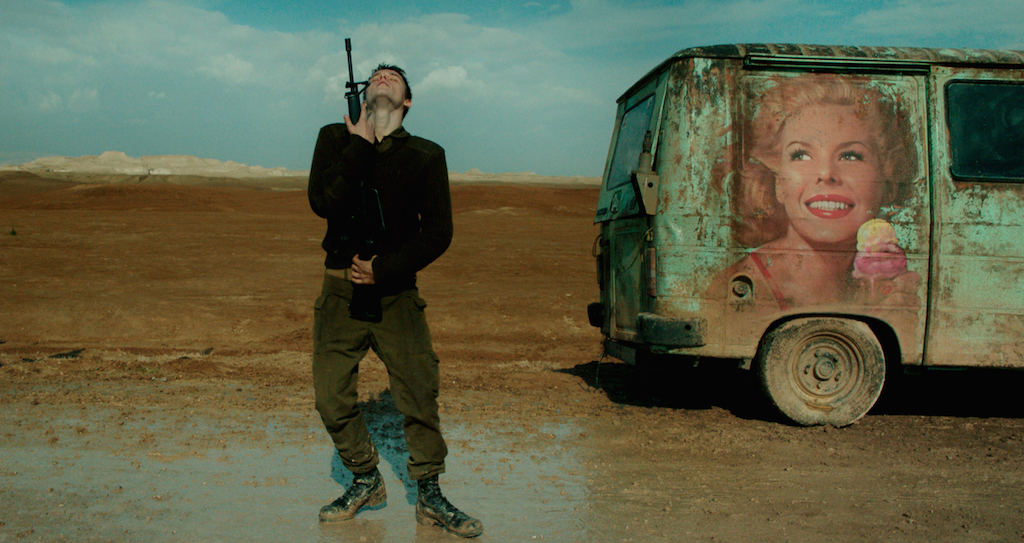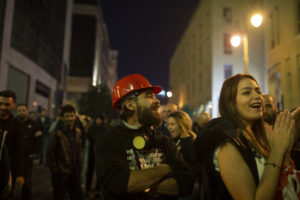‘Foxtrot’ Director Samuel Moaz Unpacks the Trauma That Remains After War
The filmmaker follows up his award-winning "Lebanon" with a moving reflection on the interplay of history and fate. A scene from "Foxtrot." (Sony Classics)
A scene from "Foxtrot." (Sony Classics)
Samuel Maoz based his first film, “Lebanon” (2009), on his experiences as a tank gunner during the early days of Israel’s war on Lebanon. The feature, which won three awards at the Venice Film Festival, including the Golden Lion, was based largely on Maoz’s life in 1982, at the age of just 20.
“Foxtrot,” his long-awaited follow-up to “Lebanon,” could be read as that movie’s spiritual sequel. Set in contemporary Israel, it explores the ways history and fate bind generations to each other’s mistakes and sorrows.
Lior Ashkenazi (“Norman,” “Late Marriage)” plays Michael, a veteran and a successful architect, husband to a beautiful woman (Sarah Adler) and father to a sensitive, artistic son now serving in the military. Michael has buried his own battle trauma deep inside, and it is left to the audience to reckon with the price his family pays for that repression.
Maoz spoke about his inspiration for the film, his unorthodox methods of directing actors, and why he chose to structure his second movie as something like a Greek tragedy.
Sheerly Avni: Michael was a young soldier in Lebanon, just like you, and just like the young men in your first film. He seems “fine.” But we learn quickly, through the eyes of his wife, his son and even his dog, that he is not fine at all.
Samuel Maoz: When people talk about PTSD [post-traumatic stress disorder] from war, they imagine a person shaking, having nightmares, being unable to function. But it’s not always like that. People can live, raise families, be successful, but still they are totally fucked up. They don’t have any way to release their anger or their pain, so it comes out in strange ways, as it does in the film.
But if I had to say the meaning of “Foxtrot” in one sentence, I would say it is the story of a man’s dance with his fate. A conflict between love and guilt, love that copes with extreme emotional pain. I wanted to continue to investigate, in an intensive manner that combines criticism and compassion, a human dynamic created in a closed unit.
SA: When you were directing actors in “Lebanon,” you made them sit in hot containers for hours while you banged the walls with iron pipes. What approach did you take with Lior Ashkenazi?
SM: Well, I do push and push until I get the reaction I need. I usually keep the camera running between takes. And much of the time I talk through the shot, so with Lior, I would be going after him, pushing him hard, talking nonstop, sometimes even tellling him things like what his wife says in the film: “You’re weak! You’re not brave!”
SA: So you tortured him!
SM: (Laughs) My normal crew knows my methods. But it’s true, if I have to work with a new crew, they often think I’m crazy. And I do warn the actors beforehand. I tell them, “I’m going to do some experimenting, and you need to fly with it, even if it seems weird.”
And with Lior, look—in a normal film, you might have one scene in which a character learns, or thinks he’s learned, that his son is dead. But no, for Lior, it was 10 days straight from six in the morning to six in the evening. He had to be in that moment of the first hour of grief. And if there is even one moment when the actor breaks that state on screen, the whole thing falls apart.
And he embraced it. Every day, after six, he would go home, eat dinner, sleep for four hours, wake up at midnight and go over his lines until 6 a.m. He showed up looking exhausted and drained, which is exactly what we needed.
SA: You have three generations in the story: a mother who is a Holocaust survivor, her son, who is a soldier in Beirut, and then the son who is almost cursed by his father’s mistakes. Do you also mean to suggest the story as a metaphor for the country as a whole?
SM: Of course. There are so many ways to read the story. It can be a terrible coincidence, or it can be crime and punishment, or you can also interpret the story as the closing of a fateful circle—one that is started by the father’s actions, and then led to his son’s fate in the second war.
One difference is that with “Foxtrot,” I was not looking for a realistic depiction of what it’s like to be at war. I wanted all those scenes where the son is working at a roadblock to feel a bit like a dream. I have no interest in a film about a checkpoint or a roadblock. The roadblock is a microcosm of an apathetic or anxious society, and of a distorted perception that stems from a terrible past trauma.
SA: What about the film’s many metaphors around burials? Of people, of evidence, of the truth.
SM: We bury the truth in the mud that we created rather than confront it and ask ourselves penetrating questions. Every human society should strive to be better, to improve itself. And the basic and necessary condition for improvement is the ability to accept self-criticism. But when self-criticism is marketed to the people as a betrayal, and critics are considered to be traitors, you have no chance of rising. You just bend, sink and roll down, until the mud where you bury your truth eventually swallows you up.
When I criticize the place I live in, I do it because I want to protect it. I do it because I worry. I do it from love.
Independent journalism is under threat and overshadowed by heavily funded mainstream media.
You can help level the playing field. Become a member.
Your tax-deductible contribution keeps us digging beneath the headlines to give you thought-provoking, investigative reporting and analysis that unearths what's really happening- without compromise.
Give today to support our courageous, independent journalists.




You need to be a supporter to comment.
There are currently no responses to this article.
Be the first to respond.